Kategorie: ‘Biotechnology’
My experiences in Oslo
- Molecular and Applied Biotechnology (MA)
- Norway, Oslo
- University of Oslo (UiO)
- 01/10–30/11/2022
I completed a two-month research internship at the Department of Biomaterials of the University of Oslo (UiO). In the following, I would like to tell you about my experiences before and during my stay.
Finding an internship and an accommodation
Although my home university, RWTH Aachen University, does not have an Erasmus partnership with UiO, I came into contact with the institute through my student assistant supervisor, who completed his Bachelor’s thesis there. After a lot of back and forth about the date and topic of the internship, writing a project plan and applying for accreditation of the internship at my home university, the big challenge of finding a place to live began. Unfortunately, my application for student accommodation with SiO, the student organisation in Oslo, was rejected – probably because of my short period of stay – and I had to look for accommodation on the private market. I sent many requests on finn.no and hybel.no, most of which I didn’t even get an answer to, but in the end I had found a room in a 2-person shared flat and nothing stood in the way of my internship. To get there, I decided to go green and first took the train to Copenhagen, where I had a one-day stopover, and then continued by Flixbus through Sweden to Oslo.
The internship and my working environment
My workplace was the Department of Biomaterials at the Institute of Clinical Dentistry, which is part of the University of Oslo. It was essentially a research laboratory of the dental clinic, and most of the research conducted there had to do with dental implants in the broadest sense. I was warmly welcomed and integrated into the team from day one. We were an international research group with a few Norwegians and many scientists from all over the world. Apart from me, there were two other interns, a German and an Italian, and both were Master’s students just like me.
Compared to my experiences in Germany, the hierarchies at our institute were quite low and hardly noticeable, and social interaction was very important: Not only did we have lunch together every day, but we also had many nice conversations, especially on the days when someone had brought a cake or something typical from their home country after visiting or receiving visitors. Sometimes we also organised social events – for example, an international lunch on United Nations Day on 24 October: Everyone was assigned a country from which they had to cook and bring something typical. My country was Tanzania and I made vitumbua (coconut rice pancakes), a popular street food. Before Christmas, socialising became even more important, so on the last day of my internship, I sat in the lunch room with my supervisor, my professor and some other colleagues and folded paper Christmas stars while eating homemade gingerbread.
Although the working atmosphere was quite relaxed, we not only took breaks and drank coffee (which, by the way, was free for all employees, including interns), but also worked in the lab and were very productive in conducting experiments. My project was about validating a method to study cell adhesion to different surfaces. Since my internship was comparatively short, I already started to conduct my experiments independently after a one-week introduction. I had quite a tough schedule and on some days I had to give up my lunch break for the sake of the experiments, but my colleagues always supported and motivated me, so I was able to overlook this and very much enjoyed going to work. In the end, I had a lot of useful results that hopefully contribute to the progress of research on this topic. However, I did not only work on my project alone, but was also part of a project group in which my internship project was embedded. We had weekly meetings and one week we even had a two-day meeting with partners from other countries, where we shared results of previous research as well as ideas about future research tasks and planned the next steps. Of course, social events were also part of it, and so it happened that we not only played minigolf together, but they also took me to a fine dining restaurant, which was the first time in my life.
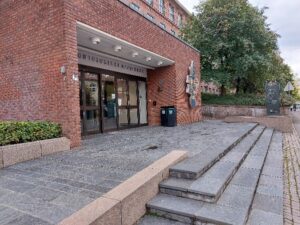 Entrance of the Institute of Clinical Dentistry © Friederike Götz
|
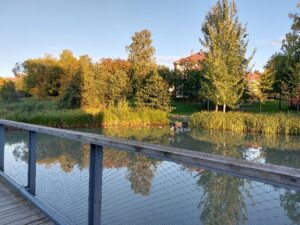 Pond right next to my flat © Friederike Götz |
Financial considerations
The cost of living in Oslo, as in all of Scandinavia, is quite high. My room rental was only two-thirds covered by the Erasmus+ funding, and the costs for daily needs such as food had to be paid on top of this, of course. At first I was a bit shocked by the prices in the supermarkets, which were sometimes twice (or even more) as high as in Germany. I didn’t go to restaurants often, which would have been even more expensive, and I didn’t buy alcohol – thanks to the high taxes on alcohol (and sugar) in Norway. But I have also found some ways to save money in everyday life: In the supermarkets, “Tilbud” is the word that indicates special offers. The weekly offers are often already sold out at the beginning of the week, but if you have the opportunity, it is worth taking it and getting groceries as well as cosmetics and other products much cheaper. Another insider tip is Grønland Frukt Og Grønt (located in Smalgangen 2), a shop where you can buy fruit and vegetables, but also spices and other foodstuffs at reasonable prices.
Free time in Oslo
At the beginning of the internship, the weather was still quite nice and I often explored the city after work and at the weekends. I had a student travel ticket that allowed me to drive all around the city and explore the city centre, the many parks, the harbour and lots of other sights. Since I love sports and play tennis in Germany, I didn’t want to give it up in Oslo either. There was a Facebook group to find tennis partners – which I made use of. Since the court rental was quite expensive, I often played in the morning before work, because then the prices – especially for students – were considerably cheaper. Although my institute had a small gym that I could use, I signed up for SiO Athletica, the student organisation gym that has several locations all over the city. I participated in some courses and on Sundays sometimes in walks that started in Kringsjå, the part of Oslo where the largest student housing is located. There is a beautiful lake there called Sognsvann with many hiking trails around it.
As my internship progressed, the days became noticeably shorter and the weather no longer invited me to spend too much time outside. These times were perfect for sauna visits. Together with some colleagues and friends, I booked a private group sauna that swam in the Oslo Fjord, with a beautiful view of the opera and the possibility to jump into the fjord if it got too hot inside.
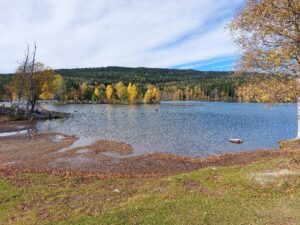
Sognsvann © Friederike Götz
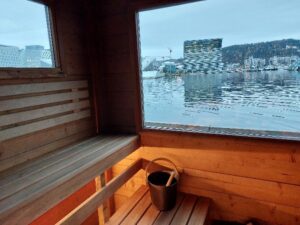
Sauna in the Oslo Fjord © Friederike Götz
Our weekend trip to the Nærøyfjord
One weekend, I went on a trip to the fjord scenery of Norway together with some of my internship colleagues. We rented a car (which was more difficult than expected, as we needed either a credit card or a Norwegian bank account, which neither of us had) and drove almost 8 hours to Voss, a municipality near Bergen. The drive took longer than expected because there was heavy rain that day and several times we came to places where a Norwegian stood next to a car with hazard lights on in the dark in the rain and told us that the road was closed and we had to take another route. In the end, we arrived at our accommodation right on the lake – which was now more or less in the lake, as our basement was flooded. Fortunately, the water had not damaged much and the upper floors were enough for us to sleep. So we were able to enjoy our weekend including an acquaintance with the unpredictable strength of Norwegian nature and a ferry trip on the Nærøyfjord, one of the two UNESCO fjords in Norway. The ferry went from Gudvangen to Flåm, a village famous for its railway, and was pleasantly empty as we were there outside the main season. Although the weather was not the nicest, the view was fantastic and I took many impressive photos that will always remind me of this unique experience.
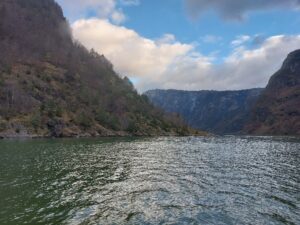
On the ferry in the Nærøyfjord ©Friederike Götz

View of the lake at our accommodation in Voss © Friederike Götz

View of the Nærøyfjord from Stegastein viewpoint © Friederike Götz

Waterfall in Nærøyfjord © Friederike Götz
My experiences in the Netherlands
- Biomedical Engineering M.Sc.
- Netherlands, Utrecht
- UMC Utrecht
- 01.06.2022 – 16.11.2022
Preparation:
To give myself some headroom to deal with the difficult housing market, I started looking for positions about nine months before the planned starting date. By the time I had found a position it was just four months to the starting date so that also had some implications on the available options in the housing market. A lot of general information pages about going abroad in the Netherlands recommend housing agencies like SSH to find student or some form of affordable housing. However, some of these agencies rely on a long waiting list, where it is more likely to get a housing offer the longer you are on the list. So, if you are running low on time, you can probably skip these options and look for alternatives, which saves you money in the process. This is another peculiarity of the Dutch housing market. While the German housing market is fairly accessible through online portals where you can see most of the available housing for free, the Dutch housing market is essentially locked behind a paywall, where most services require a subscription to contact any of the landlords. I found housing through the university hospital, which was by far the cheapest option compared to the private market. I was also required to make an appointment with the municipality for the registration purpose well in advance. I was able to get an appointment about four weeks away from the date I was looking on.
Commuting:
The Dutch system called OV-chipkaart makes commuting easy. It is essentially a prepaid (or bank account linked) public transport ticket which allows you to take every bus or train by simply checking in at the station or in the bus when you get on and checking out when you leave. It may be a little intimidating at first because you are always second guessing yourself if you have checked out correctly, but you can also register your chipkaart in the NS (Nederlandse Spoorwegen) App where you can check your latest chipcard activities. You can either order a personalized (bank account linked) card online, which takes about two weeks, or get a prepaid one at your local supermarket like Albert Heijn or Jumbo. I took the prepaid option which was still very comfortable because recharging stations are readily available at all train or bus stations and even some other locations like supermarkets. However, commuting by bus may become a noticeable financial burden because every trip you take has a flat base fee plus a per kilometre fee. Especially the base fee becomes very noticeable on short distances common inside the city.
With all of that said though, the obvious choice for commuting in the Netherlands is naturally the bike. Especially in Utrecht the bike infrastructure is exceptional. There are well maintained bike paths and bike storage everywhere which makes commuting by bike a treat. I took my bike from Aachen to Utrecht by train which is easy via the NS intercities.
Every-day life/internship:
Life in the Netherlands isn’t really all that different from life in Germany. Supermarket prices are a bit more expensive in some categories but are generally comparable to the ones you would fine here. This also applies to your average take out service, where a decent portion of fries will set you back about 3 € and a high-quality pizza is about 10 €. Payment services are also a non-issue in the Netherlands if you have a German debit card. There are very few places, if any, where you will encounter the need for cash because everything is paid by card, and I haven’t had any issues with my debit card (no extra fees or anything).
The Dutch working culture is also kind of similar but one thing I have encountered during my stay is that they put less emphasize on the lunch break. The lunch breaks were generally quite short (often just shy of 30 minutes) and primarily focused on food consumption. However, this may be attributed to the group I was working in. My internship was in the neuro engineering department of the Medical Centre Utrecht, which was a very international and highly goal oriented, so I spent a lot of time working.
Utrecht as a city also offers great recreational opportunities in forms of parks and proximity to farms around the campus. I regularly took strolls along the fields after work. If you take a bike, there are also a lot of historical landmarks within reach, including a lot of different forts and castles.
Conclusion:
While the housing situation and cost of living may be a little overwhelming in the beginning, the Dutch culture is very approachable and welcoming. The country offers a great experience in terms of travel, be it by bike or by public transport, which was a welcome change from the car centrist life in Germany. The university hospital in Utrecht is very well equipped and offers knowledge in a wide range of topics.
Bulgaria – a hidden gem for internships
- Molecular and Applied Biotechnology M.Sc.
- Stara Zagora, Bulgaria
- Zagorka AD
- 04.10.2021-31.12.2021
Finding an internship position
Students from abroad are generally very welcome in Bulgarian companies. Therefore, looking for a position is not a hard task, however, one should make research about companies in the desired area. Then, a direct contact to the company is recommended and not relying on jobsites such as Jobs.bg. The idealcandidate.bg is also focused on showing internship positions from the biggest companies. In my case, things happened really fast – in a matter of a month from obtaining first contact to negotiating the conditions.
Preparation
In most cases, companies have specific requirements about documents, which could differ. However, what you need is a medical insurance and nothing else if you stay for less than 3 months and come from the EU. German insurance companies provide the European Health Insurance Card, which is tricky since not every hospital works with it. Lots of Bulgarian companies provide additional private health insurance for their employees which is completely enough, and one should ask about it in advance. Bank account is not necessary, and phone contracts are not needed since you can use a German number up to three months in the EU. However, I recommend making a short term voucher contract since it is always easier to communicate with locals.
One should always ask about specific medical examinations, since companies are obliged by law to ask for specific ones before starting. I needed to spend two days visiting different doctors.
Finding a place to stay
It is a hard task since most of the companies would not offer an apartment for a short period only. However, websites as Booking.com or AirBnB provide cheap places and a huge variety of locations. As everywhere, in big cities such as Sofia, Plovdiv or Varna, foreign students are not an exemption. Therefore, you can always find Facebook groups with useful tips or apartment offers, but one should always be aware of fraud.
Transportation and free time
In big cities public transport is often okay, but with a personal car things are much easier everywhere. If you need to travel to work, it is often cheaper to choose a place in proximity to work and go by foot.
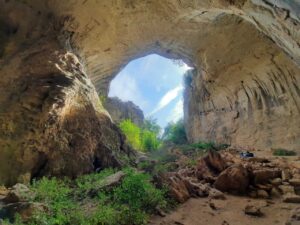
© Stanislav Yordanov
Bulgaria has an amazing variety of natural and historical objects and I used to spend almost every weekend with a good weather travelling. Sofia is much more different than smaller cities offering almost everything and can be compared with cities like Cologne when considering free time activities.
One-day or weekend trips can be done in every direction. I would recommend the Rila, Stara Planina and Rhodope mountains, as well as Plovdiv – considered the oldest city in Europe. For summer internships, Black Sea is a must considering the variety of resorts – from small hippy campings to the Ibiza-like Sunny Beach.

© Stanislav Yordanov
Advices
Bulgaria is a hidden gem in finding an internship. However, I recommend choosing a big international company in a big city when looking for an internship. As an intern, you would have the same rights as a regular worker and get almost equal pay (if negotiated so). You could also expect to get fast personal tasks and get a very direct feedback. One should also always demand regular contracts in his/her language. If possible, ask for a mentor or a buddy during the stay, with good English skills such as another company’s employee. That could be very useful when problems arise and ensures a smooth transition and start in the company. I also recommend a Facebook account, since locals use mostly Messenger or Viber for communication while WhatsApp is rarely used.
Those approx. three months were very different and dynamic period and a back-to-the-roots experience for me which showed me a future career path and let me learn a lot. I am very thankful to Erasmus+ financing it and making this experience possible.

